- Home
- Roger Smith
Nowhere Page 4
Nowhere Read online
Page 4
“After two years of catching snoek and living like a beach bum you suddenly pitch up large as fuckin life to investigate this mess at Genadendal?”
“It was a request. From the president,” Louw said.
“Was it now? A request or a threat?”
“Why would he threaten me?”
Filander shook her head. “That’s what I don’t know. And not knowing irks the living shit out of me.”
“There’s nothing to know.”
“Nothing? Sweet fuck all?”
“As you say.”
She looked at him and shrugged and pointed to the chair opposite hers.
“Sit, Colonel.”
Louw and Filander sat in silence for a moment, the woman staring out the window at that most schizophrenic of South African cities—beaches and mansions here on the peninsula, festering ghettoes out on the sprawling Cape Flats.
When she swiveled her chair to look at him she was smiling and he could glimpse that wild beauty from twenty-five years ago. Shanelle Filander had been hot, had famously bedded many a struggle icon. Now, in her early fifties, she had gained weight and a pack-a-day habit hadn’t done her skin any favors, but this was still a woman who was used to being desired, a woman at ease in the company of men.
She produced a pack of Camels from her desk drawer. “You want one?”
Louw shook his head even though he did want one. Jesus, craved one to calm his bloody nerves.
Filander fired up, inhaling like she was on a life-support system. She kicked off her shoes under the desk and massaged her bare feet against the carpet.
“Joe,” she said, drawing on her smoke, the use of his first name getting his heavy shoulders hunched, waiting for the attack, “there are only two reasons why they would bring you in to investigate this. First, it’s like they’re saying and the bodyguard did it and they’re confident enough for a guy like you, Mr. Bloody Incorruptible, to dig around in the president’s wife’s personal shit. Second, it’s all a pack of lies and they need you to give it the seal of approval.” She squinted at him. “So which is it?”
“I will report what I find.”
“You’re telling me, Joe, that whatever you uncover, you’re going to tell the god’s honest truth?”
He felt a tightening in his gut, saw his wife’s face right near the end, saw her eyes, huge and clouded with pain and fear at the sight of her onrushing death, and he nearly told this woman what had happened this morning, why he’d been forced to do this and bugger the consequences, but he said, “Yes. As I said, I’ll report what I find.”
“When I heard they were bringing you in I had my people check you out. Couldn’t find a thing. You’ve got money, not anything suspicious, but enough to live out your life comfortably. And the death of that woman, what was her name?”
Louw knew she knew the name but he said it anyway: “Rose MacDonald.”
“Yes, terrible thing that. Christ. Anyway, that’s done and dusted and nobody blames you, do they?”
“Only me.”
She squinted at him through smoke. “Ja, I can imagine.” She puffed. “Nothing else. No scandal. So if they have got to you—”
“Nobody’s got to me.”
“—it’s something hidden deep and dark.” She massaged her forehead. “I just don’t want any shit on my patch, you hearing me?’
“Yes.”
“I’m told you want to keep independent of my police? Want to run this show from your room at the Holiday Inn?”
“Yes.”
“Okay, that’s fine by me. It’ll be your mess.” She waved her cigarette. “Go. Go do what you gotta do.”
He stood and as he headed for the door she said, “But be careful, now. You know the president and I go back a long way, don’t you?”
“Yes, I know that,” he said from the doorway.
“He hasn’t got where he’s got by playing nice. And that wife of his. Uh uh.” She spoke in rapid-fire Afrikaans. “Daai ding was so los soos ’n ou tuinhekkie.”
That thing was as loose as an old garden gate.
Louw had to laugh as he quit the premier’s office.
Under different circumstances he’d have liked her.
NINE
The car was an embarrassment, a tiny mauve bug—the kind of thing a doting suburban dad bought for his teenage daughter to drive to college—that seemed in danger of rolling off the road like a tumbleweed.
When Zondi had landed at Kimberley and gone to the rental company to claim the sensible sedan (a sturdy Nissan or Toyota) that Mrs. Marsh had reserved for him, he’d discovered some rugby event was happening in the town and all that remained was the midget Opel, the runt of the litter left spurned in the car park.
So Zondi’d had no choice but to cram himself into the miniature car and make for Nêrens.
He could’ve commandeered an unmarked cop car for his mission to Witsand but the official plates would have stood out like tits on a bull where he was going.
So he sat hunched over the wheel, staring out at the road that lay like black paint on the parched earth, the little car juddering and jerking, as skittish as a puppy.
This was his first time in the Northern Cape, South Africa’s largest and emptiest province—bigger than Germany, with a population of less than a million—and the first time he had seen the southern Kalahari, this expanse of red dunes and prehistoric quiver trees. Zondi had grown up in the harsh Tugela Ferry area of KwaZulu-Natal, but that was a verdant Avalon compared to the landscape he drove through.
The Opel had no GPS so Zondi searched for the turning to Witsand. It was marked by a sign ventilated by the obligatory bullet holes. He left the asphalt and groaned when he saw a dirt track, the kind of road built for muscular pickups and four-wheel drives.
Stones pelleted the underside of the car and the miserable AC did little more than suck dust into the cabin. At last Zondi saw a high barbed wire fence and a gate with a boom. The coat of arms of the old Boer republic—an eagle gripping in its talons a shield bearing the likenesses of a lion, a soldier with a bobbejaanboud flintlock, an ox wagon and an anchor—was was mounted on the boom, and an orange, white and blue flag hung limp from a pole.
A sentry box stood beside the boom and a massive blond youth dressed in khaki shorts and shirt was crammed inside like a sideshow curiosity.
The boy, cross-eyed and slack-jawed, stepped out of the box carrying a rifle, and when the dust cleared enough for him to see Zondi’s dark face he reared back as if he’d brushed against an electric fence.
Zondi rolled down the window and flapped his ID.
“Investigator Zondi to see Magnus Kruger,” he said in Afrikaans.
The youth seemed uncertain of what to do, so he retreated into his hutch and unclipped the walkie-talkie from his belt, the thing emitting a squawk as he powered it up.
Zondi listened to the conversation, waiting for the word kaffir. It didn’t come. The giant kid said “black man,” a number of times and then he stepped out of the booth and raised the boom.
He pointed into the distance. “The road will take you to the general’s house.”
Kruger, a man who had served in no legitimate army, had borrowed a trick from many an African dictator and bestowed this high rank upon himself.
Zondi put the car into gear and lurched away. Within a minute he came to the first dwellings: rusted and dented mobile homes in the sparse shade of thorn trees, their flat tires sunk into the red earth.
He glimpsed a bent old woman in a housecoat, her legs cratered and pitted with sores, removed frayed clothes from a rope line, a filthy baby wailing at her feet.
The trailers gave way to a cluster of identical little brick houses with aging cars and pickup trucks baking in the sun in their dusty yards.
Zondi saw no teenagers, only a handful of adults over forty: men all in khaki, bearded, and women in dowdy dresses. The faces that turned his way were ravaged by poverty and brutality and alcoholism and hatred.
There
were no TV aerials or satellite dishes.
No cell phones. No Internet. No iPads. No piercings. No graffiti.
No black or brown or yellow faces.
The road died at what must have been the original farm house, a stone building dating from the early 1900s, with a deep, shady porch. Zondi levered himself out of the car into the blowtorch heat, aware of invisible eyes upon him.
He set off toward the door across a strip of sparse grass that fought a losing battle against sun and sand.
A shape hurtled around the side of the house and charged at Zondi. A dog. A muscular beast, of a strain bred for mayhem. Most terrifying was that the animal didn’t bark, just came at him with a low gargle in its throat.
Zondi froze. He knew that this dog could smell his blackness, that it was a trigger for the race hatred that ran as thick in its blood as in its master’s.
He could already feel the fangs, yellowish, dripping with saliva, sinking into him when a whistle from within the shadows of the house brought the dog to a scuffing, sliding halt, close enough to Zondi for the stink of its breath to reach him.
Two more whistles had the dog reluctantly retreating, still eyeing Zondi ravenously.
Zondi composed himself and climbed the five stone steps. An enormous man, leaning back to balance his massive belly, appeared in the doorway, wearing khaki, his beard scraping the mound of his protruding gut.
Eyes as small and dark as rat turds regarded Zondi who held out his ID and then unfurled the arrest warrant.
When the man spoke it was in an incongruously high-pitched voice.
“We do not recognize the law of your country here. This is an independent Boer republic.”
A deep voice rumbled from within the house. “Let him come in, Commandant.”
The man sighed and stepped back, flicking a paw.
Zondi walked into the dim cool of the house. Dark furniture. The smell of Cobra beeswax polish and dust and fire-cooked meat. Dead trophy animals watched his progress as he walked down the corridor, the wooden boards creaking beneath the immensity of the man who followed him.
Zondi found himself in a dining room. A quartet of men, all in late middle-age, big, bearded, dressed in khaki, sat at a yellowwood table. The room reeked of sweat, pipe tobacco and rendered fat.
The fifth man stood by an empty fireplace, as if posing. A tall, heavy man in his late sixties, still strongly muscled, with a maniac’s blue eyes and a shovel-shaped white beard. He drank from a tumbler—brandy and Coke Zondi guessed—and when he placed it on the mantelpiece beneath the Boer flag the glass chimed softly against the stone.
Nobody spoke. An old clock ticked.
“What is your business here, my friend?” Magnus Kruger said at last in English that was fluent but accented.
The voice was deep and rich, with an actor’s vibrato, a voice he used to good effect when he addressed his people. A voice that could roar and weep, that could wring the maximum emotion from his sentimental, hate-filled bombast and lend it a semblance of profundity.
“Magnus Kruger I have a warrant for your arrest for the murder of Tshepang Moshweng,” Zondi said in Afrikaans and showed the warrant.
The men at the table sat up like a pack of dogs, growling, but Kruger waved them down.
“You have come alone?” he said.
“Yes.”
“Are you armed, my friend?”
“No.”
“A brave man. Or a stupid one.”
Zondi said nothing.
“Thank you,” Kruger said.
“For what?”
“For not coming with a squad of policemen from the town. It would have inflamed tempers here.” He pushed away from the fireplace. “I’ll go with you.”
The pack bayed again, and again he silenced them with a gesture.
“First I’m going to call my attorney in Pretoria and then I’ll pack an overnight bag. Is that acceptable?”
“Yes.”
Kruger left the room. Zondi stood with his hands in his pockets. The men glowered. A fly buzzed. He heard a snatch of a hymn sung in Afrikaans from a distant radio. He looked at the closed faces of old Boer generals on the walls, faces of men who had fought disease, poverty and exhausted genes as well as the British and the Zulu.
A movement drew his eye and he saw Kruger at the far end of the long corridor, opening a door. An ancient woman in a wheelchair was framed against a window. She squinted at Zondi and, at last, he heard what he knew would come sooner or later.
“What is that kaffir doing here?” the old woman said.
“He is one of their policemen, Mother,” Kruger said, and then he closed the door and the conversation was lost.
Zondi waited a few more minutes, immune to the glares of the men.
Kruger returned with a leather Gladstone bag, like so much else a relic from a bygone era.
“I suppose you need to look inside?” Kruger said.
“Yes.”
Zondi opened the clasps of the bag. Toothbrush and toothpaste. Fresh underwear and khakis. An Afrikaans Bible and a pair of reading glasses.
“Okay.”
“Do you need to search me?”
“No.”
“Are you going to handcuff me?”
“I don’t carry handcuffs.”
“No gun and no handcuffs?”
“No.”
“What kind of a policeman are you?”
When Zondi didn’t reply Kruger shook his head, a flicker of amusement in his eyes. He walked toward the front door, his acolytes trundling after.
The knowledge of Zondi’s mission had spread by osmosis and men, women and a sprinkling of children under ten—barefoot, skinny white limbs protruding like chicken bones from their brown clothes—stood around the silly little car that wore a shroud of red dust. When they saw Zondi and Kruger there was a low, menacing buzz.
Kruger raised his hands.
“Stay calm, my people. We have endured worse. There is a war being fought. A genocide against the Boer volk. And I am a prisoner of that war. For now. But I will return.”
He walked forward and the crowd parted. Zondi was jostled and cursed at in glottal whispers.
Kruger spotted the car and did a double take. “Dear god are we going to the police station or the disco?”
His followers laughed derisively and the mood changed with Zondi’s perceived humiliation. They were good at this, these Boers.
Break you with fists.
Break you with words.
There was no question of the big man squeezing into the rear so Zondi opened the passenger door and Kruger, grunting, lowered himself into the car that sank under his weight.
Zondi closed the door and walked to his side of the Opel. He sat behind the wheel and started the car. The crowd didn’t move. He nosed the car forward and at last they parted and he drove away.
TEN
Steve Bungu was in one of the outbuildings at Genadendal, in the room of the president’s senior bodyguard. The room of a soldier. Or a fanatic. Squared away bed. No dirt. No dust. No clutter. The only decoration a framed photograph of the man’s three little kids displayed on the bedside table.
The bodyguard, Sipho Gumede, immaculate in his dark suit and white shirt and black tie, stood at parade ground rest, while Bungu lolled in a chair and massaged the knee that the security police had fucked up many moons ago.
“You understand where we are with last night’s business?” Bungu said.
“I do, sir.”
“And what are your feelings?”
“I’m not paid to have feelings, sir.”
“Good answer.” Bungu stood and limped to the table and lifted the photograph. “Nice kids.”
“Thank you, sir.”
“You have feelings for them?”
The man's face twitched. “Yes, sir, I do.”
“They up in KwaZulu with their mommy?’
Another twitch. “Yes sir.”
Bungu set the picture down.
�
��I had an issue a few years back. Man I trusted betrayed that trust. He too had a family out in the sticks. Wife and a couple of little picaninnies. I went up there and shot the wife and drowned the two kids in a pit latrine and burned the house down.”
The man swallowed. Blinked. Bungu could smell his fear.
“I think you’re hearing what I’m saying?”
“I’m hearing you, sir.”
“I don’t like fuckin KwaZulu. Backward fuckin shithole. If I’m forced to travel up there I’ll be in one motherfucker of a mood. Don’t give me a reason to have to go there.”
“No sir.”
“I’m trusting you to keep the other three assholes in line. Any one of them fucks up, you suffer the consequences. Are we clear?”
“Yes sir.”
“Okay then.”
Bungu walked out and crossed the car park, taking in the rear of the mansion and the terraced gardens beyond, the view dominated by the mountain and its frilly cloud.
He grunted as he hauled himself up into the cabin of his SUV and folded away the silver reflector that rested against the windshield, protecting the interior of the car from the fierce African sun. But rays had sneaked through the side window and he cursed as he burned his hands on the steering wheel.
Bungu started the car, cranked up the AC and let Al Green’s “How Can You Mend a Broken Heart” take him into the city.
ELEVEN
When he gained the asphalt road—the little mauve car darting like a ratter beneath the boom—and Disaster Zondi reached for the gear shift to change up, his hand was, for a few seconds, juxtaposed with that of Kruger’s, who, his bulk swelling out of the cramped passenger seat, sat with his thick, reddish-brown mitt resting on his thigh, and Zondi thought of that video and briefly entertained the pungent notion of pulling the car off the road and reaching for an imaginary firearm and executing the unrepentant racist, leaving his blood to drain into the soil he professed to love so much, the soil he swore had been vouchsafed his volk and his volk alone in a long ago pact with some khaki-clad Boer god who even now gazed down from an all-white heaven.

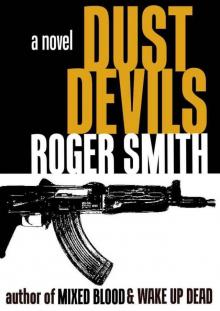 Dust Devils
Dust Devils![[2013] Sacrifices Read online](http://i1.bookreadfree.com/i/03/19/2013_sacrifices_preview.jpg) [2013] Sacrifices
[2013] Sacrifices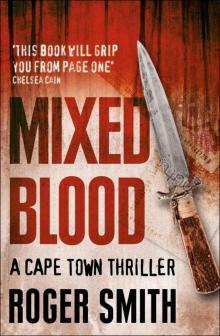 Mixed Blood
Mixed Blood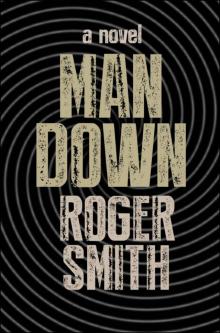 Man Down
Man Down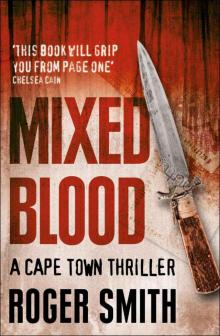 Mixed Blood ct-1
Mixed Blood ct-1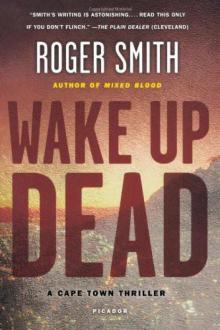 Wake Up Dead: A Thriller (Cape Town Thrillers)
Wake Up Dead: A Thriller (Cape Town Thrillers)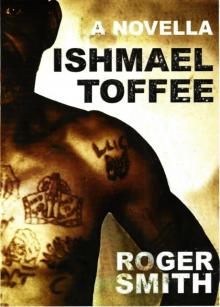 Ishmael Toffee
Ishmael Toffee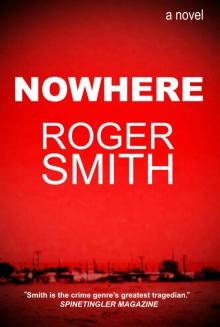 Nowhere
Nowhere Sacrifices
Sacrifices